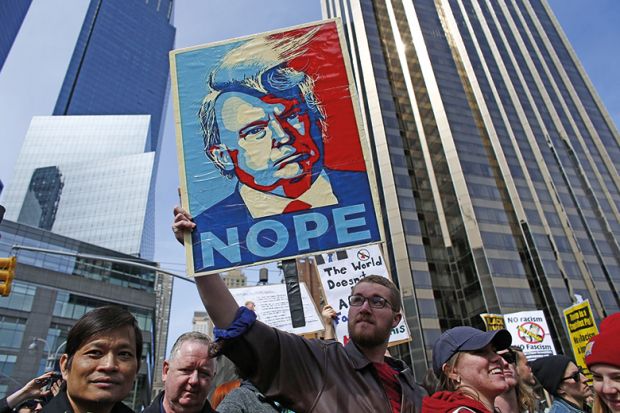The president of New York University has played down suggestions that the election of Donald Trump as US president will trigger a downturn in international student recruitment.
Andrew Hamilton told the Times Higher Education World Academic Summit that the impact of the Republican’s anti-immigrant rhetoric on overseas enrolment had “not…been as serious as we had feared”, and that the number of foreign learners starting courses at NYU had “never been higher”.
However, Professor Hamilton conceded that New York’s “vibe” and reputation as a city that “does not express particularly strong affection” for Mr Trump may protect it against adverse effects being felt elsewhere.
Research conducted earlier this summer found that almost half of US universities had reported a decline in the proportion of international undergraduate students accepting admissions offers after the election of Mr Trump, while a survey published in March found that nearly 40 per cent of institutions were seeing declines in overseas applications.
Some observers have blamed Mr Trump’s ban on travel from six Muslim-majority countries, and the introduction of a tougher visa regime.
But Professor Hamilton, who was vice-chancellor of the University of Oxford for six years before moving to NYU, said that NYU had been largely unaffected.
“Right now, we have seen no impact on applications [of international students]…it certainly won’t help, the rhetoric coming from Washington, but it has not at this point been as serious as we had feared,” he told the event hosted by King’s College London.
The number of international students in the incoming cohort at NYU “has never been higher”, Professor Hamilton added, explaining that more than a quarter of the institution’s students are from overseas.
Suggesting a possible reason for NYU’s success at a time when other institutions were reporting a decline in applications, Professor Hamilton said: “New York City has its own vibe and sense of itself that it projects to the world…It is a city that does not express particularly strong affection for [Mr Trump].”
Professor Hamilton was participating in a panel discussion on the place of students in a world that feels increasingly isolationist in parts and also heard from Sabine Kunst, president of Humboldt University of Berlin.
Professor Kunst said that the UK's vote to leave the European Union should give German institutions an opportunity to secure more international students.
She said that this feeling was particularly strong in Berlin, which is currently fashionable among young people and has a “great chance at the moment”. “Universities of Berlin…are trying to get a more leading role in German rankings to enforce the attractiveness for foreign students and scientists,” Professor Kunst said.
About 20 per cent of the institution’s non-domestic students come from the UK, she said. “We expect changes [to this] but nobody knows in which direction precisely,” she added.




